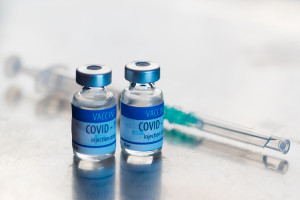How Philly Tech Companies Are Modernizing Coronavirus Clinical Trials
The results of some studies are still being recorded on paper. These local companies have developed the tools to change that.

Jim Murphy is the chief executive officer at Greenphire. The company, based in King of Prussia, provides tech solutions that improve clinical trial enrollment and retention. / Courtesy photo
The basic tenets of the modern clinical trial haven’t changed in nearly three centuries, and on some level, that’s a good thing. Researchers today still use placebos, a concept developed in the 1800s, to alleviate any psychological influence that might skew study results. Most trials are randomized and double-blind to avoid bias. And scientists are still required to document, in painstaking detail, every step of their study process, much like James Lind did with his controlled study of scurvy in the mid-1700s. These methods have stood the test of time, resulting in a proven process for bringing the safest and most effective treatments to the patients who need them.
There are other parts of clinical trials, however, that beg for modernization. Archaic methods like collecting data with pen and paper or distributing paper check payments for trial participants slow down an already laborious process. And now, new restrictions put in place to stop the spread of coronavirus have made it even more difficult for researchers to keep their trials on schedule, let alone make improvements to long-held inefficiencies in the process. Because the need for well-organized and speedy clinical trials is more pressing than ever, Philadelphia tech companies are stepping up to address both the traditional shortcomings of clinical trials and the new hurdles that arise, supporting the world’s scramble for a vaccine.
One of the key challenges researchers are facing amid coronavirus is a lack of safe transportation for patients in clinical trials. The trials heavily rely on the ability to have patients come into sites to take medicines or participate in evaluations at various points in a study. With stay-at-home orders in place across the country and around the globe, some sites have struggled to keep patients on track with scheduled trial protocols.
King of Prussia-based software company Greenphire surveyed more than 1,800 clinical trial site personnel worldwide about the impact of COVID-19 and found that more than 60 percent of the sites lacked access to a service that could safely transport medical equipment and medicine to trial participants’s homes.
“With the onset of COVID-19, many clinical trial sites in the U.S. and around the world are facing enormous obstacles to maintaining trial continuity, and many patients are at risk of not being able to get their study medication, supplies or support they need,” said Jim Murphy, chief executive officer at Greenphire.
In April, Greenphire launched ConneX Patient Direct, a new service that provides “clean transport” for medications, equipment and healthcare professionals to visit patients in their homes. The company was already known for its ConneX service, which facilitated travel for clinical trial patients to get to the clinic. The new service adds the ability to transport medicines, equipment and even site team members to clinical trial participants’s homes, enabling patients to receive much-needed medications and monitoring, and allowing sites and sponsors to continue their trials without disruption.
Other inefficiencies in clinical trials existed long before COVID-19. Take, for example, the little-known fact that in most clinical trials, data is still collected using old-fashioned paper and pen.

Ed Seguine is the chief executive officer of Clinical Ink.
According to Ed Seguine, chief executive officer of Horsham-based clinical technology company Clinical Ink, a whopping 90 percent of all data collected in clinical trials begins on paper.
“It’s one of those surprising factors that even in this era where we’ve adopted technology and electronic medical records, physicians and clinicians are still writing their notes down on paper and then putting them into databases and patients are keeping paper diaries and then transmitting notes to a site to be captured and analyzed,” Seguine explained.
On average, it can take anywhere from three days to three weeks to move data from paper to an electronic system, which significantly slows down the early stages of a trial. It’s an issue Seguine says his team was working to address before the pandemic began.
“Even before COVID-19, we thought there’s got to be a better, faster, quicker way to impact the operations of a clinical trial,” he said.
Clinical Ink developed Direct Data Capture, a technology platform that enables patient data to be captured digitally from day one. Researchers and analysts can then access and remotely monitor the data using Lumenis, the company’s electronic data capture system that collects and stores everything from documents, audio and video to handwritten notes. Seguine says Clinical Ink’s technology can shorten a trial’s length by as much as 50 to 75 percent.
In 2014, the company’s platform played a critical role in clinical trials for Ebola. The ability to allow remote data analysis in real-time proved especially important for keeping healthcare workers safe from contracting the Ebola virus while conducting research. Clinical Ink has since been approached by several potential partners and sponsors interested in using the technology for COVID-19 studies. According to Seguine, Clinical Ink’s technology platform is supporting two active studies for the treatment of COVID-19 respiratory symptoms, including a study being run at Temple University and at Mount Sinai Health System in New York.
Seguine believes new technology and operational changes will be critical to helping researchers bring potential COVID-19 treatments and vaccines to market quickly.
“When people ask me how fast can we get a vaccine and how fast can we do a clinical trial, I always say that is a function of which technology you’re using. And if you’re using paper to run a trial, it’s going to have a lot of operational headaches and lag time and that’s why even in a normal environment, clinical trials take four to five years because of operational hurdles,” he said. “Regulatory agencies are encouraging new ways of doing business because, like Clinical Ink, they know operational innovation in clinical trials ultimately leads to scientific innovations that can really make a difference.”


